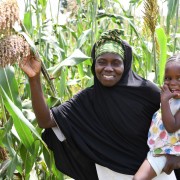Speeches Shim

The Katibougou Farmer’s Cooperative in Koulikoro, Mali, hosted its first Feed the Future Farmer-to-Farmer (F2F) assignment in September 2010 when American expert Alan Leo led a people-to-people exchange to help members build and strengthen their agribusiness co-op. Since that time, F2F Mali has connected skilled American volunteers with the Katibougou Farmer’s Cooperative to participate in trainings on topics ranging from agro-forestry to animal husbandry and entrepreneurship development. When asked about the impact, Amadou Diaby, President of the Cooperative, responded “Honestly, I will need a few hours to explain my satisfaction.”

Yacouba Diarra, an émigré from Côte d’Ivoire to Mali, has lived and worked in the small southern community of Bougouni since 2005. Diarra is a member of the 70 member Bougouni Farmers’ Cooperative (BFC), and they organize fishermen and animal breeders to mutually support one another to increase production, improve nutrition, and raise incomes throughout their community. “I have a deep gratitude to the Farmer-to-Farmer program,” says Diarra.

Today marks the start of Feed the Future Week, highlighting progress made in addressing the root causes of poverty, hunger and malnutrition in the global effort to end hunger. This year, the U.S. Government’s Feed the Future initiative commemorates its 10-year anniversary and a decade of impact, including seven years delivering results in Mali.

The United States Agency for International Development (USAID) has issued a $4 million grant to the World Food Program (WFP) in Mali to help mitigate the negative effects of COVID-19. The award will provide food assistance to more than 196 thousand food insecure Malians in Kayes, Bamako, Ségou, Mopti, Timbuktu, Taoudeni, Kidal, Ménaka and Gao regions.


Comment
Make a general inquiry or suggest an improvement.